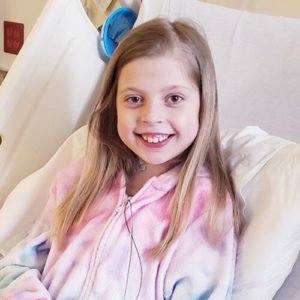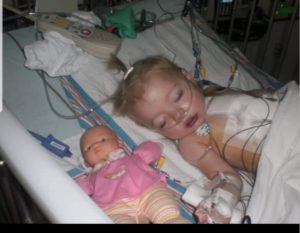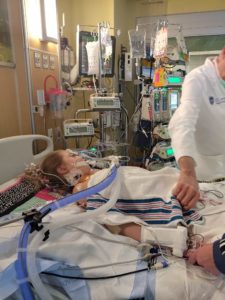Our Patients:
Meleya Haberberger

In December 2008, Tiffany Haberberger found out at 17 weeks of pregnancy that her unborn daughter had a very complex congenital heart defect known as hypoplastic left heart. For a child with this heart defect, most of the left side of the heart is small and underdeveloped. This usually affects the mitral valve, the aortic valve, the aorta and the left ventricle. When the left ventricle is small and poorly developed, it can’t pump any or enough blood out to the body. Without medicines and a series of three surgeries to rebuild the heart, babies with hypoplastic left heart syndrome (HLHS) won’t survive. The left side of the heart can’t be fixed, so the goal of the surgeries is to rebuild parts of the heart and “redirect” the way blood flows. Baby Meleya was born May 7, 2009 just before Mother’s Day. In addition to her hypoplastic left heart, Meleya was found to have some other complicating conditions. She had heterotaxy syndrome, situs inversus, and polysplenia (the presence of multiple spleens). In heterotaxy syndrome, the organs in the chest and abdomen are arranged in patterns that are different than normal. Situs inversus is a genetic condition in which the organs in the chest and abdomen are positioned in a mirror image from their normal positions.
Meleya had her first corrective heart surgery at 7 days of age. At 9 months of age, she had a Blalock-Taussig shunt (or “BT Shunt”) placement surgery to help increase blood flow to her lungs. At 18 months of age, Meleya had her second, planned corrective heart surgery known as a Kawashima procedure. She also had a pacemaker placed at that time. Her 4th and final corrective surgery was her Fontan procedure in July 2012 when she was 3 years old. Surgery was successful; however later that year, she had both a pulmonary stent and aortic arch stent placed due to narrowing in both of those areas. Meleya had a break from major interventions from 2013 until 2016. She lived a relatively normal life, achieving all developmental milestones, going to school, enjoying activities, etc. But years of suboptimal blood flow, and unusual fluid distribution due to her underlying heterotaxy caused Meleya to develop Protein-Losing Enteropathy, otherwise known as PLE.
With PLE, there is excessive loss of proteins through the GI tract. This leads to gut swelling (ascites), low serum protein levels, and malnutrition. Her liver was also “tired” from poor blood flow, so it was unable to keep up with her body’s demand to make MORE protein.
Several attempts with high protein diets and medication were made between 2016 and 2018 to address the symptoms of her PLE, but nothing helped. In Summer of 2018, Tiffany knew something more needed to be done. She followed her instinct and brought Meleya to SSM Health Cardinal Glennon. Dr. Charles Huddleston, SluCare Cardiothoracic Surgeon, had performed 3 of Meleya’s open heart surgeries, and she wanted all of Meleya’s ongoing needs to be coordinated and managed where he practiced.
After a lengthy admission during the month of July, in Cardinal Glennon’s Transitional Care Unit for evaluation and management, Meleya was discharged home with a nutrition regimen, a PICC line (used for IV medication or fluid management), and a continuous Milrinone drip (medication to ease the load on the heart). She was also placed on the heart transplant list. The goal over the next several months was to keep her healthy enough to receive a new heart. Meleya’s underlying heterotaxy and other genetic abnormalities presented too many co-morbid conditions to allow her “corrected heart” to function efficiently enough for survival. Months of continuous IV medication and monitoring ensued. Meleya had little exercise tolerance; was limited from swimming and had to opt out of some of her favorite passions like race car driving (YES – race car driving) and amusement park rides. But she didn’t let her restrictions stop her from enjoying everything else that 9 year-old’s do!
On February 19, 2019 at 5:30am, Tiffany got the much-awaited call from Organ Transplant Coordinator, Erin Foristal, RN. It was the day after Tiffany’s birthday. Tiffany recalled that moment saying, “Erin told me to get to the hospital at 8:00am. Meleya’s heart is arriving at 9:00pm tomorrow.” Meleya entered the Operating Room at 2:30pm 2/19, and remained there until 6:45am on 2/20. Dr. Andrew Fiore prepared Meleya’s body for her new heart, while Dr. Charles Huddleston made the trip to retrieve the donor heart and bring it back to Cardinal Glennon. Both surgeons worked together to complete her transplant surgery and allow her a new chance at life. “There was so much going on right after her transplant surgery”, Tiffany said, “But I remember Dr. Fiore talking to me right after they finished. He said, ‘Everything went great. After reviewing all of her records, and seeing all of her anatomy with the corrections once we got started, she was truly a 100% chance of mortality with everything she had going on. It’s amazing she made it this long’.” Meleya spent the next 10 days in the Pediatric Intensive Care Unit, and then another 7 days in the Transitional Care Unit. She was discharged after 17 days total on March 8, 2019.
Since then, Meleya has been adjusting to post-transplant life. She takes a least 10 different medications each day, and comes to the Dorothy and Larry Dallas Heart Center weekly for clinic visits, which include things like EKG’s, Echocardiograms, bloodwork and visits with her cardiologist, Ken Schowengerdt, MD, and her transplant nurse, Erin. Her first visit was on 3/11, and her second was 3/14. Her testing on 3/21 revealed some signs of mild rejection (some thickening of the lining of her heart), so she was admitted to the hospital for a cardiac catheterization and biopsy. Her biopsy results confirmed a mild rejection, so she remained in the hospital for 8 doses of IV steroids, and was discharged a few days later on a tapering dose of oral steroids. Meleya remains on her steroid taper. As of her visit on 4/2, there had been no increased signs of rejection noted, and she is excitedly planning her summer, which includes Six Flags, swimming and race car driving a Junior Dragster.
Tiffany has enjoyed watching Meleya thrive since her transplant. “Her appetite is better. Her tummy size is back to normal. She’s not hooked up to medication anymore. She still has some pulmonary hypertension, but her body and her lungs just need to adjust to her new heart. I’m looking forward, cautiously optimistic to all the possibility from here”, Tiffany says. “I’m so grateful to have her team at Cardinal Glennon. The care and compassion stand out here, and we wouldn’t want her anywhere else.”

